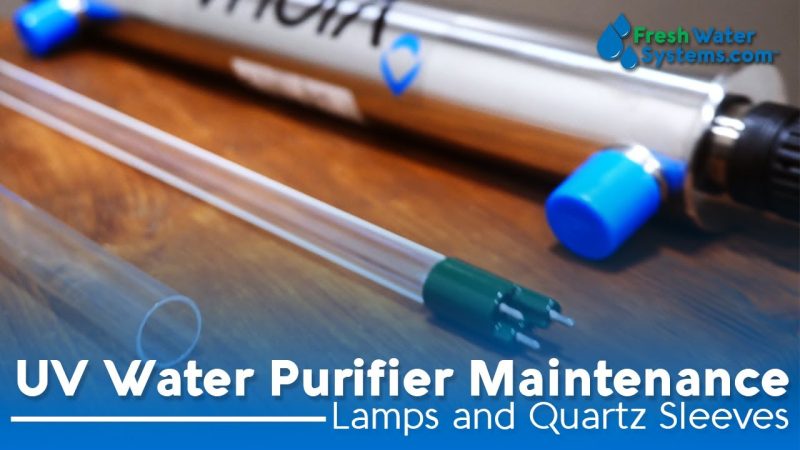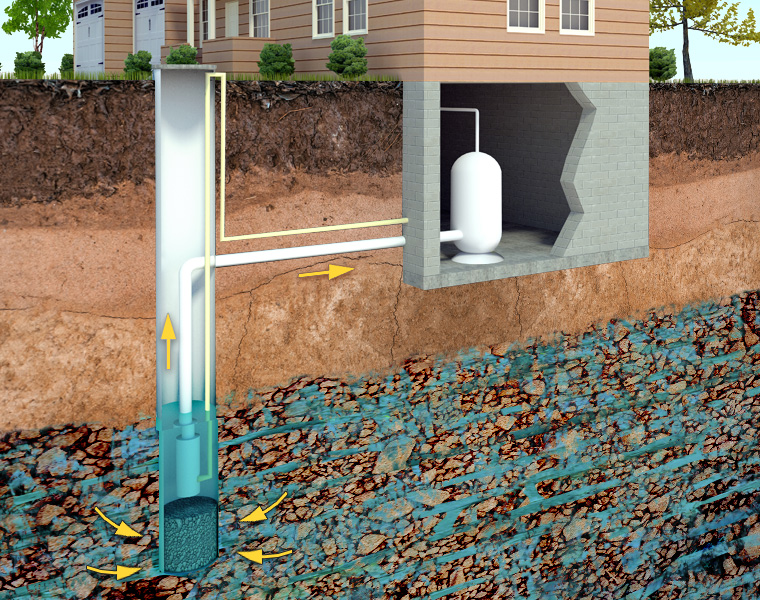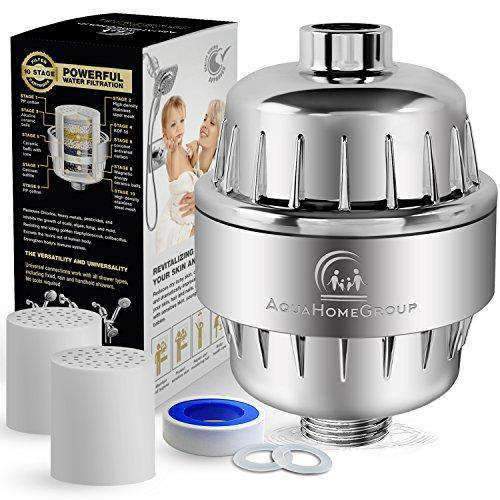This post contains affiliate links. As an Amazon Associate, we earn from qualifying purchases.
A home water filter system may not necessarily require a uv filter. However, it depends on the type of contaminants in the water and the filtration system used.
Water filtration systems have become a popular addition to many homes, providing clean and safe drinking water. While there are various types of filters available, homeowners may wonder if a uv filter is necessary. Uv filters use ultraviolet light to disinfect water, killing bacteria, viruses, and other microorganisms.
But, not all water sources contain these harmful contaminants, and some filtration systems can effectively remove them without uv. Therefore, the decision to install a uv filter ultimately depends on your specific water source and filtration needs. Understanding your water quality and the various filter options available can help you make an informed decision.

Credit: www.reddit.com
Understanding Home Water Filtration Systems
Are you considering investing in a home water filtration system? You might be wondering whether or not it should have a uv filter. In this section, we’ll be discussing the various types of home water filters available, explaining how each one works and comparing their effectiveness.
Overview Of The Different Types Of Home Water Filters Available
There are several types of home water filters available that work differently. Here’s an overview of each one:
- Activated carbon filters: These filters use activated carbon to remove impurities by attracting and absorbing contaminants such as chlorine, sediment, and volatile organic compounds.
- Reverse osmosis filters: This type of filter uses a semi-permeable membrane to remove a wide range of impurities, including minerals, fluoride, and bacteria.
- Distillation filters: These filters utilize heat to turn water into steam, removing impurities as the water is transformed back into a liquid state.
- Ceramic filters: Ceramic filters contain small holes that trap bacteria, sediments, and other contaminants as water passes through.
- Uv filters: Ultraviolet filters use uv light to destroy bacteria and viruses, making water safer to drink.
Explanation Of How Each Type Of Filter Works
Here’s a brief explanation of how each type of filter works:
- Activated carbon filters: Contaminants are removed by passing water through activated carbon, which binds the impurities to the surface of the carbon.
- Reverse osmosis filters: Water is forced through a semi-permeable membrane that captures impurities.
- Distillation filters: Water is boiled, turning it into steam, which is then condensed back into liquid form. This process removes any impurities as impurities cannot evaporate.
- Ceramic filters: Water passes through small holes of the ceramic filter, which captures bacteria, cysts, and sediments.
- Uv filters: Uv light is used to damage the dna of bacteria and viruses, making them unable to reproduce.
Comparison Of Their Effectiveness
Each type of water filter has strengths and weaknesses. Here’s a comparison of their effectiveness:
- Activated carbon filters: These filters are effective at removing organic compounds, but they do not remove minerals, bacteria, or heavy metals.
- Reverse osmosis filters: These filters can remove a broad range of impurities, including bacteria and viruses.
- Distillation filters: This filtration system removes all minerals and bacteria, but it is not as effective at removing volatile chemicals as activated carbon filters.
- Ceramic filters: These filters are effective at removing impurities such as bacteria and cysts, but they do not remove chemicals or minerals.
- Uv filters: Uv filters are useful in killing bacteria and viruses, but they don’t remove impurities or chemicals from the water.
Understanding the different types of home water filtration systems available, how they work, and their effectiveness will help you determine which system is right for you. Whether you’re looking for safer drinking water or to reduce impurities for a healthier lifestyle, choosing the correct type of filter will ultimately impact the quality and safety of water in your home.
The Importance Of Water Purity
Highlight The Importance Of Drinking Clean Water
Clean water is essential for the body to function properly, and access to clean drinking water is an integral part of our daily lives. Water is a critical resource that sustains us, and it is important to ensure that the water we drink is free from contaminants.
Here are some reasons why you should prioritize drinking clean water:
- Drinking clean water ensures that your body stays hydrated, which is crucial for optimal health.
- Clean water can help keep your immune system strong and prevent illnesses caused by waterborne pathogens.
- Drinking clean water can also improve the taste and odor of drinking water.
- A home water filter system that includes a uv filter can effectively remove all types of contaminants and bacteria, making your water safe to drink.
Discuss The Potential Health Risks Of Consuming Contaminated Water
Water is essential for life, but it can also be a source of contamination that affects our health. Contaminated water can pose significant health risks and can cause various infections and other health concerns. Here are some potential health risks of consuming contaminated water:
- Consuming water contaminated with harmful chemicals can lead to several illnesses, including cancer.
- Drinking water contaminated with bacteria and viruses can result in gastrointestinal problems like nausea, vomiting, and diarrhea.
- Contaminated water can have adverse effects on children’s development and pregnant women, leading to growth defects and birth defects, respectively.
- Chlorine-resistant pathogens like cryptosporidium and giardia can cause severe health issues like hepatitis a, e. coli infections, and legionnaires’ disease.
Elaborate On The Consequences Of Not Filtering Your Water
Not filtering your water can lead to various health problems and put your life at risk. Here are some of the consequences of not filtering your water:
- Drinking unfiltered tap water can expose you to harmful chemicals like lead and fluoride, which can negatively affect your health over time.
- Without a filtration system, your drinking water could have an unpleasant taste and odor, making it less appealing to drink.
- Not filtering your water increases the risk of exposure to waterborne pathogens, which can cause diarrhea, vomiting, and other gastrointestinal issues.
- If you live in areas with inadequate sanitation, not filtering your water can lead to the spread of diseases like cholera and typhoid fever.
Water filtration is crucial for ensuring that you have a safe and reliable water supply. A home water filtration system that includes a uv filter can provide you with clean and fresh water for drinking, cooking, and cleaning. So, prioritize investing in a reliable water filtration system to lead a healthier life.
The Role Of Uv Filters In Water Filtration
Water filtration is crucial to ensure clean and healthy drinking water. With so many types of filtration systems available in the market, it can be challenging to choose the one that best suits your needs. We will discuss the role of uv filters in water filtration systems.
Explain The Specific Function Of Uv Filters In Removing Harmful Contaminants From Water
Uv filtration has become increasingly popular in recent years. While other filtration systems use mechanical or chemical processes to remove contaminants, uv filters use ultraviolet light to disinfect water. When water passes through a uv filter, the uv radiation destroys the genetic material of microbes such as bacteria, viruses, and protozoa, preventing them from reproducing and rendering them harmless.
Uv filters do not remove minerals or chemicals from the water, which means that the water’s taste, odor, and clarity remain unchanged.
Compare The Effectiveness Of Uv Filters To Other Types Of Filters
While uv filters are effective in killing bacteria and viruses, they cannot remove other types of contaminants such as sediment, heavy metals, or chemicals. This is why most home water filtration systems include other filtration stages such as sediment filters, carbon filters, or reverse osmosis membranes in addition to uv filters.
Here’s a quick comparison of how different types of filtration methods work:
- Sediment filters remove large particles such as sand, silt, or rust from water.
- Carbon filters remove chlorine, volatile organic compounds (vocs), and other chemicals that affect the taste and odor of water.
- Reverse osmosis membranes remove dissolved solids, minerals, heavy metals, and other contaminants from water.
While sediment and carbon filters are the most common pre-filters you will find in water filtration systems before the uv filter, reverse osmosis membranes can replace the uv filter for more advanced systems with higher requirements.
Provide Examples Of Scenarios Where The Use Of Uv Filters Can Be Crucial
Uv filters are a cost-effective and eco-friendly alternative to other disinfection methods. Here are some scenarios where the use of uv filters can be crucial:
- Well water: If you use well water as your primary source of drinking water, it is essential to disinfect it before use to prevent waterborne diseases. Uv filtration is an effective way to treat well water without using chemicals.
- Camping or traveling: When you are camping or traveling in remote locations, you may not have access to clean drinking water. A portable uv filtration system can help you disinfect water from lakes, rivers, or other natural sources.
- Emergency situations: During natural disasters or emergencies, the water supply may get contaminated, making it unsafe to drink. A uv water filtration system can provide clean drinking water when you have no other options.
Uv filters play a significant role in providing safe drinking water by destroying harmful microbes. While they may not remove sediment, heavy metals, or chemicals, other filtration methods can complement the uv filter’s effectiveness. Understanding the specific function and limitations of each filtration stage can help you choose the best water filtration system for your needs and budget.
Arguments For And Against Uv Filters For Home Water Filtering
Water filtration systems come in various types, but one of the most effective is a ultraviolet (uv) filter, which kills bacteria and viruses in water. Some wonder whether uv filters are necessary in home water filtration systems, given that conventional filters can remove pollutants.
Therefore, this article addresses the arguments for and against installing uv filters in home water filtration systems.
List And Explain The Arguments In Favor Of Installing Uv Filters In Your Home Water Filtration System
Uv filters have some advantages over conventional filters. Here are the reasons:
- Effectiveness: Uv filters can kill a broader range of contaminants than conventional filters. They can eliminate bacteria, viruses, and other microorganisms that are not eliminated by other types of filters. They are more effective against certain parasites such as cryptosporidium and giardia.
- Chemical-free: Installing a uv filter means avoiding adding chemicals to the water for purification, which is not always the case with conventional filters. Unlike chlorine or other chemicals, uv only uses light to eradicate bacteria and viruses.
- Low maintenance and easy installation: Uv filters generally have very low maintenance but do require a regular lamp replacement. Additionally, they are relatively straightforward to install and operate.
Discuss Common Misconceptions About Uv Filters And Water Filtration Systems
Despite their benefits, uv water filters can also be subject to misconceptions. Here are the common misunderstandings:
- They remove minerals: Uv filters indeed won’t remove minerals and total dissolved solids dissolved, but it’s their job to sanitize the water, not to change its mineral content.
- They are affected by water turbidity: Uv filters could be less effective if the water is turbid, and you may need a filtration step to remove particles before using the uv filter. Some manufacturers offer pre-filtration systems to remove particles like sand, silt, and sediment.
- They use a lot of electricity: Installing a uv filter will undoubtedly bump up your energy consumption, but it’s relatively negligible (20-40 watts usually).
Outline The Counterarguments Against Using Uv Filters, And Their Validity
On the other hand, uv filters are not the best fit for everyone. Below are some reasons why people may not opt for a uv filter when selecting a water filter:
- Costly: Uv filters may be considered expensive compared to other types of water filtration systems. Not only is the initial installation more expensive, but the replacement lamps can also be pricier than other types of filters.
- Maintenance and replacement cost: Although uv filters are easy to maintain, they do require a periodic lamp replacement that incurs extra financial obligations.
- Environmental factors: Uv filters use electricity and must remain plugged in all the time to be functional. They also use lamps made up of mercury, which raises concerns about disposal and potential exposure.
Installing uv filters in a home water filtration system has its pros and cons. While they are easy to install, low maintenance and can kill a broader scope of contaminants, they might be costly and less sustainable in some respects.
At last, the user must weigh both sides’ arguments to choose the most suitable type of water filter system for their needs.
Frequently Asked Questions Of Does A Home Water Filter System Need A Uv Filter
Do I Need A Uv Filter For My Home Water Filter System?
Yes, a uv filter helps in getting rid of bacteria, viruses and other microbes present in the water making it safe for drinking.
How Does A Uv Filter Work In A Home Water Filter System?
The uv filter in a home water filter system uses uv lamps to expose water to uv light, which destroys bacteria and viruses by damaging their dna.
Can A Home Water Filter System Without A Uv Filter Remove Bacteria?
Yes, home water filter systems without uv filters can remove some bacteria through physical filtration, but it is not completely effective in removing all types of bacteria and viruses.
How Often Should I Replace The Uv Lamp In My Home Water Filter System?
It is recommended to replace the uv lamp in your home water filter system every 12 months or as instructed by the manufacturer.
What Are The Benefits Of A Home Water Filter System With A Uv Filter?
A home water filter system with a uv filter provides safe and clean water for drinking and cooking by eliminating harmful bacteria, viruses and other contaminants in the water.
Is A Uv Filter Necessary For Well Water?
Yes, a uv filter is necessary for well water as it helps in removing harmful bacteria and viruses which can cause water-borne diseases.
Conclusion
Installing a uv filter in a home water filtration system is not mandatory, but it is an effective method to ensure the removal of harmful microorganisms and bacteria. The uv filter is particularly helpful in eliminating pathogens in well water or tap water that isn’t chemically treated.
Its introduction causes no additional cost in energy bills, and its ability to purify water in minutes makes it a practical water treatment solution. While other water filtration systems like activated carbon filters may remove contaminants like chlorine and metals, they are not as effective in removing bacteria and viruses as uv filters.
Ultimately, the decision to incorporate a uv filter in your home water filtration system is a personal one based on factors like the quality of your water supply and your family’s health needs. Therefore, it is important to conduct thorough research and get professional advice before making a choice.



